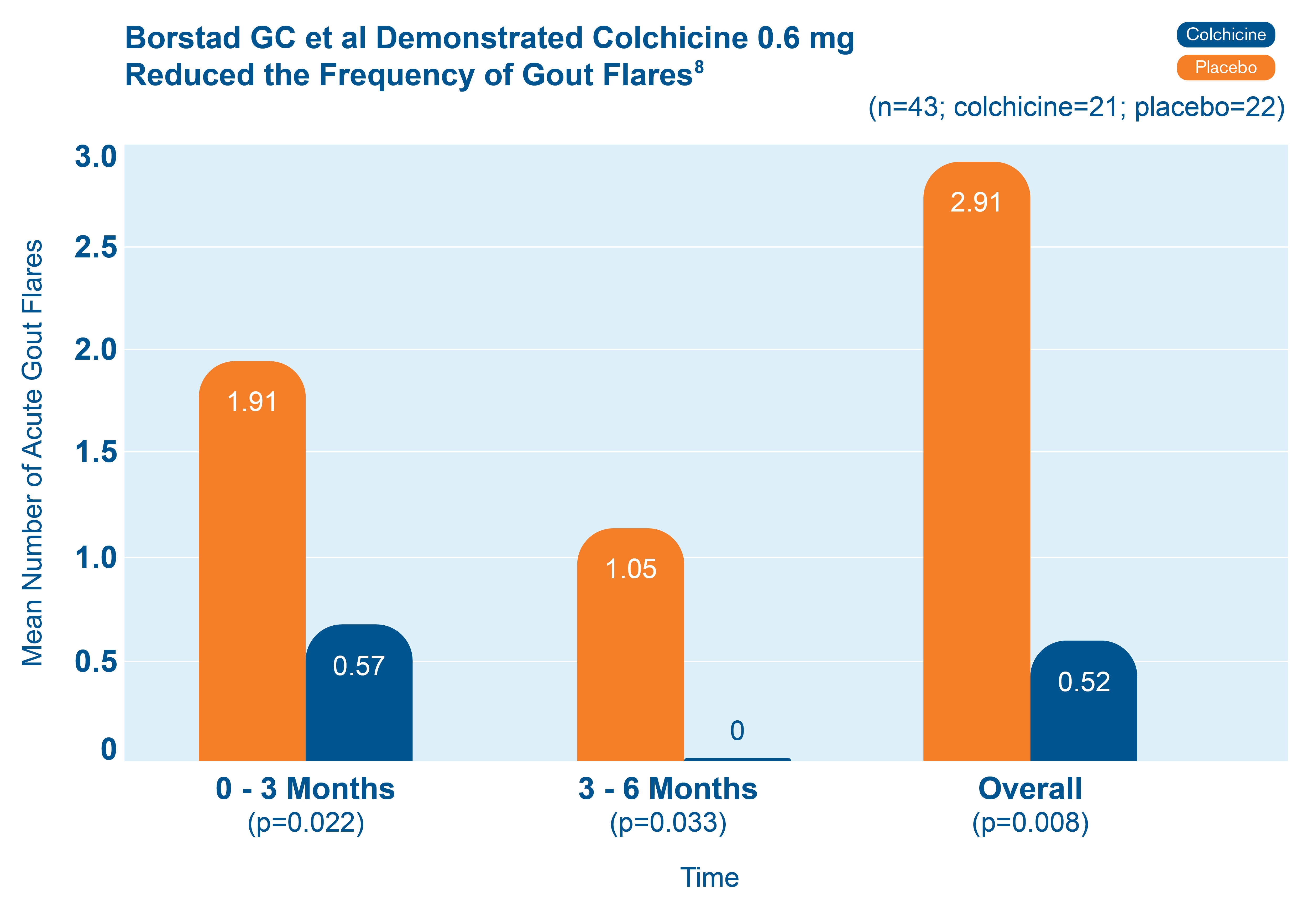
Gout is a form of inflammatory arthritis. Unlike other types of arthritis, it’s caused by a build-up of uric acid in the body. This build-up of uric acid can lead to deposits of crystals that form around the joints, often beginning in the big toe.1
People with gout sometimes have an initial occurrence, followed by a long period with no symptoms before it flares again. Eventually, however, gout flares occur more often. When this happens, gout becomes chronic in many sufferers.1
If you’re concerned that your loved one has gout, the first step is to get him or her to the doctor for an examination. If he or she is diagnosed with gout, certain lifestyle changes can help reduce the frequency of gout flares. Prescription medicines can help prevent gout flares in adults. As a loved one of an adult with gout, you can play a major role in helping to keep gout flares at bay.
Food and drink can affect gout
Humans have suffered with gout for centuries. Before the rise of modern medicine, it was believed that gout was a disease of the rich. This is because only they could afford to eat a lot of meat, seafood and alcohol, which we now know contain high levels of purines.2 Purines are chemical compounds found in some foods and drinks that the body breaks down into uric acid. Generally, people can process the uric acid that results from purine-rich foods. In people with gout, however, consuming foods and drinks with too many purines can lead to gout flares.3
There is no set diet regimen for gout, but people with gout are encouraged to eat healthfully.3 To help prevent gout flares, foods and beverages containing a lot of purines should be avoided.3
High-purine foods include:3
- Beer and grain liquors
- Red meat, lamb and pork
- Organ meats, such as liver, kidneys and sweetbreads
- Seafood, especially shellfish (such as shrimp, lobster and mussels), anchovies and sardines
Instead, choose lower-purine foods, such as:3
- Low-fat or non-fat dairy products
- Fresh vegetables
- Fresh fruit
- Nuts
- Grains
For thirst quenching, water and other drinks that contain no sugar are advised. Sugar-sweetened beverages can increase the prevalence of gout flares.4
Abstaining from alcohol is also important for two reasons. First, because alcohol provides additional purines, strengthening the body’s production of uric acid, and second, because alcohol affects how well the kidneys remove uric acid from the body. Water and non-alcoholic beverages can help remove uric acid crystals from the system.5
You can help your loved one by encouraging him or her to choose healthier foods and limit or abstain from alcohol.
Weight loss and exercise may make a difference
Weight loss can help reduce the body’s burden of uric acid. Maintaining a healthy weight is critical to many aspects of overall good health, including preventing gout flares. Talk with a doctor about sensible ways to reduce weight if necessary.6
You can support your loved one by joining his or her exercise plan, and making it fun. Regular exercise has many benefits for people with arthritis, including gout. Exercise may help reduce the risk of:7
- Coronary artery disease
- Serum lipid abnormalities, such as high cholesterol
- Hypertension (high blood pressure)
- Diabetes
- Osteoporosis
- Obesity
- Colon cancer
Exercise also may have short-term psychological benefits, which include decreasing anxiety, improving mood and helping relaxation.7
Medication proven to reduce frequency of gout flares in adults
If you accompany your loved one to the doctor’s office, be sure to ask about the various prescription and non-prescription medications that can help.3 One prescription option is colchicine, which the doctor may prescribe. , the active ingredient in a medicine called Mitigare®, has been proven effective in helping to prevent flares in adults with gout.8
Patients who took colchicine 0.6 mg daily had fewer gout flares than patients who did not.8 Patients who took colchicine also had fewer gout flares as time went on.8
Fewer total flares with colchicine 0.6 mg than with placebo8

43 patients starting allopurinol were randomized to receive colchicine 0.6 mg or placebo for up to 6 months. The chart shows the mean number of acute gout flares at the 0-3 and 3-6 month time periods, and overall.8
The American College of Rheumatology (ACR) Task Force Panel (TFP) recommends low-dose colchicine as a first-line option for gout flare prevention
The ACR Guidelines for Management of Gout state that patients should begin anti-inflammatory prophylaxis prior to or concurrent with urate-lowering therapy (ULT).9
Affordable for eligible patients
Colchicine is available in generic form from West-Ward Pharmaceuticals Corp., which introduced it immediately following the FDA’s approval of the branded form, Mitigare®. West-Ward’s colchicine 0.6 mg capsule is the only colchicine therapy available in capsule form and was the first authorized generic form of this therapy. West-Ward introduced the True Blue Savings Program for eligible patients that can help make colchicine capsules more affordable. Learn more at www.mitigare.com.
Important Safety Information
Consult with your doctor about other medications you are currently prescribed. Colchicine 0.6 mg capsules are contraindicated in patients with renal or hepatic impairment who are currently prescribed drugs that inhibit both P-gp and CYP3A4. Combining these dual inhibitors with colchicine in patients with renal or hepatic impairment has resulted in life-threatening or fatal colchicine toxicity. Patients with both renal and hepatic impairment should not be given Mitigare®.
Fatal overdoses have been reported with colchicine in adults and children. Keep Mitigare® out of the reach of children. Blood dyscrasias such as myelosuppression, leukopenia, granulocytopenia, thrombocytopenia and aplastic anemia have been reported with colchicine used in therapeutic doses. Monitor for toxicity and if present consider temporary interruption or discontinuation of colchicine. The most commonly reported adverse reactions with colchicine are gastrointestinal symptoms, including diarrhea, nausea, vomiting and abdominal pain.
NOTE: This article was not written by a medical professional and is not intended to substitute the guidance of a physician. These are not West-Ward’s recommendations for gout flare prevention, but rather facts and data collected from various reliable medical sources. For a list of resources and their attributing links, see below.
